Understanding and Addressing ADHD in Adolescents
ADHD is a neurobehavioral disorder that affects many teens, characterized by difficulty with attention, hyperactivity, and impulsivity. While medication is often prescribed, many families seek effective non-pharmacological strategies to help teens manage their symptoms. This article explores evidence-based approaches, lifestyle modifications, behavioral interventions, and supportive educational strategies that can support teens with ADHD without relying solely on medication.
Understanding ADHD: Symptoms, Causes, and Diagnosis
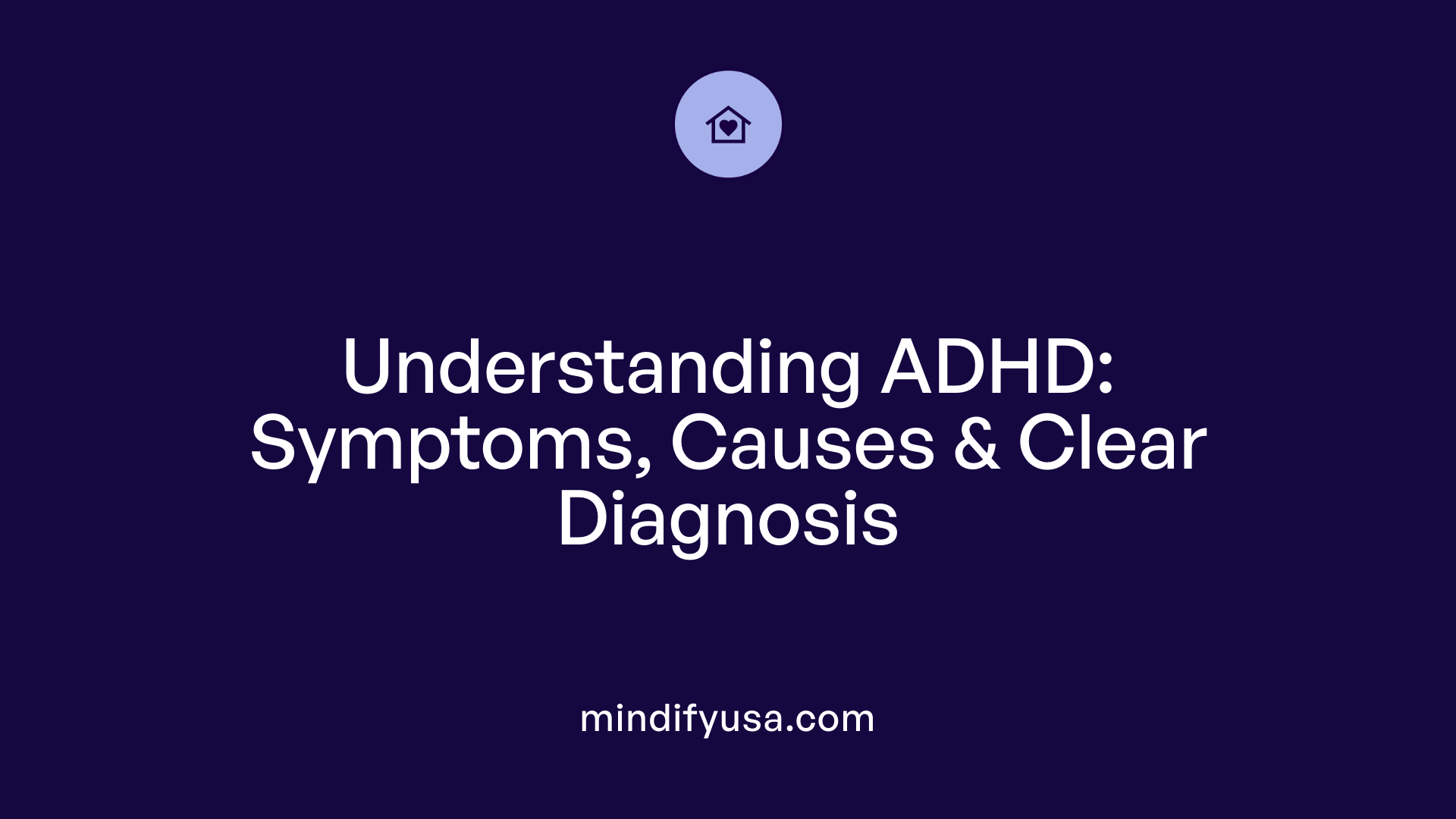
What lifestyle modifications can help manage ADHD symptoms in teens?
Adopting healthy lifestyle changes can make a significant difference in managing ADHD symptoms among teenagers. First, maintaining a balanced diet rich in fruits, vegetables, omega-3 fatty acids (found in fish like salmon, walnuts, and flaxseeds), and essential micronutrients such as zinc and iron can support overall brain health. Avoiding processed foods, excessive sugar, caffeine, and artificial food dyes can help reduce hyperactivity and improve focus.
Sleep plays a crucial role; teens should aim for 7 to 9 hours of quality sleep per night. Good sleep hygiene practices, such as establishing a consistent bedtime routine, turning off screens at least an hour before bed, and creating a calming sleeping environment, can boost attention and emotional regulation.
Exercise is another cornerstone; engaging in at least 60 minutes of physical activity each day can decrease impulsivity and hyperactivity, while enhancing executive functions. Activities like walking, biking, or team sports promote brain chemicals such as dopamine that help with attention.
Structured routines and organization tools—like planners, color-coded schedules, and visual checklists—aid in managing responsibilities and reducing overwhelm. Incorporating mindfulness practices such as deep breathing, meditation, or yoga can help teens manage stress and improve focus.
Overall, combining these lifestyle modifications with medical and behavioral guidance offers a comprehensive strategy to improve daily functioning and well-being for teenagers with ADHD.
The Role of Behavioral Therapies and Parent Training
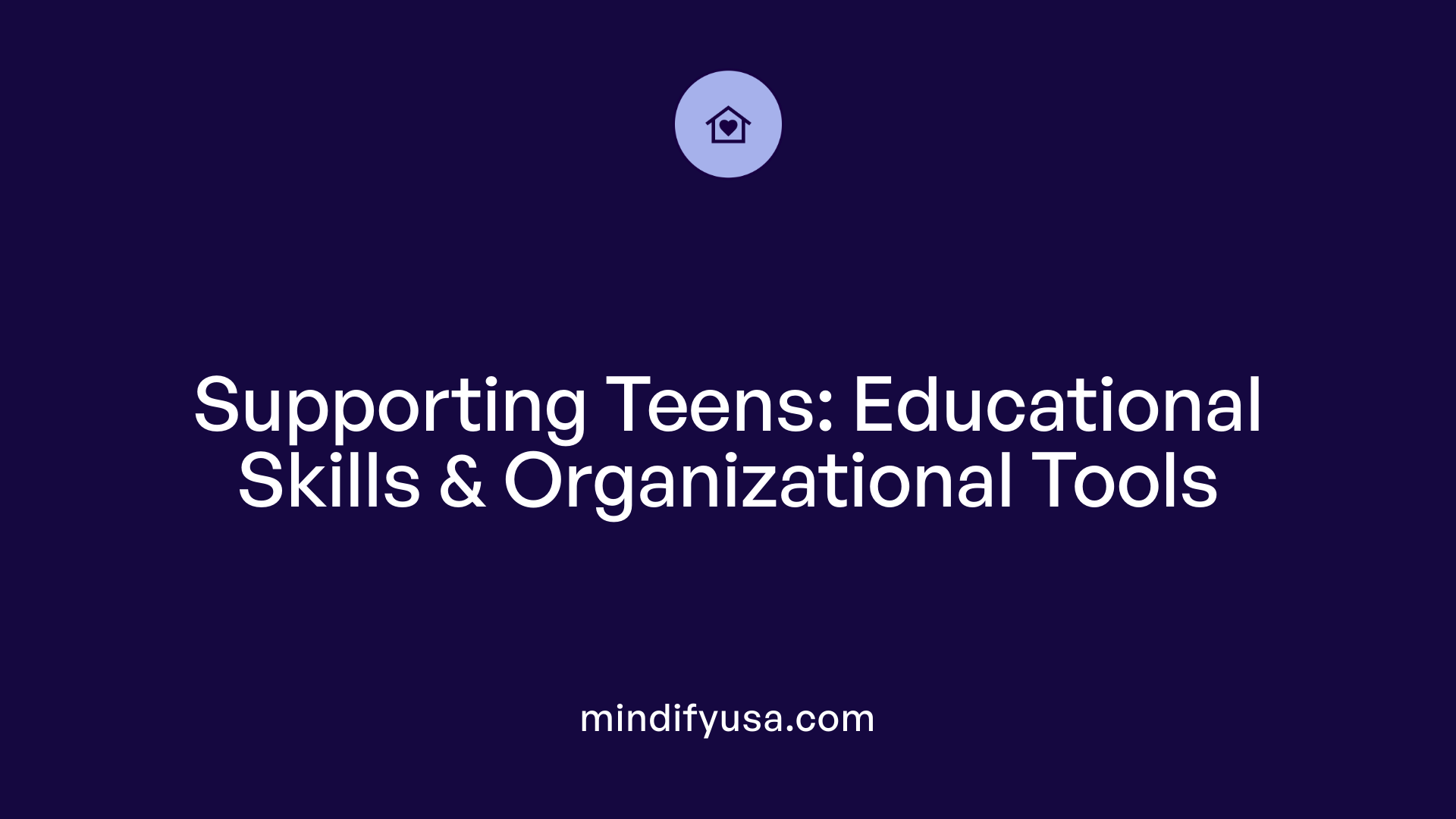
What are some educational and organizational strategies to support teens with ADHD?
Supporting teens with ADHD requires a combination of tailored educational and organizational strategies to help them succeed academically and socially.
Classroom accommodations play a significant role; these include environmental modifications such as seating in quiet areas, minimizing distractions, and providing clear, concise instructions. Establishing structured routines helps teens know what to expect, reducing anxiety and improving focus.
Organizational tools are essential. Visual planners, color-coded folders, and weekly checklists help teens manage their assignments and responsibilities. Regular check-ins with teachers and parents ensure they stay on track, fostering accountability.
Behavioral management techniques, such as positive reinforcement and reward systems, motivate teens and encourage desired behaviors. Peer support through structured social activities enhances social skills and builds confidence.
Crucial to this approach is collaboration among teachers, parents, healthcare providers, and the teens themselves. Open communication ensures consistency in expectations and strategies, creating a supportive environment where teens can develop organizational and social skills necessary for academic achievement.
Lifestyle Modifications for Symptom Management
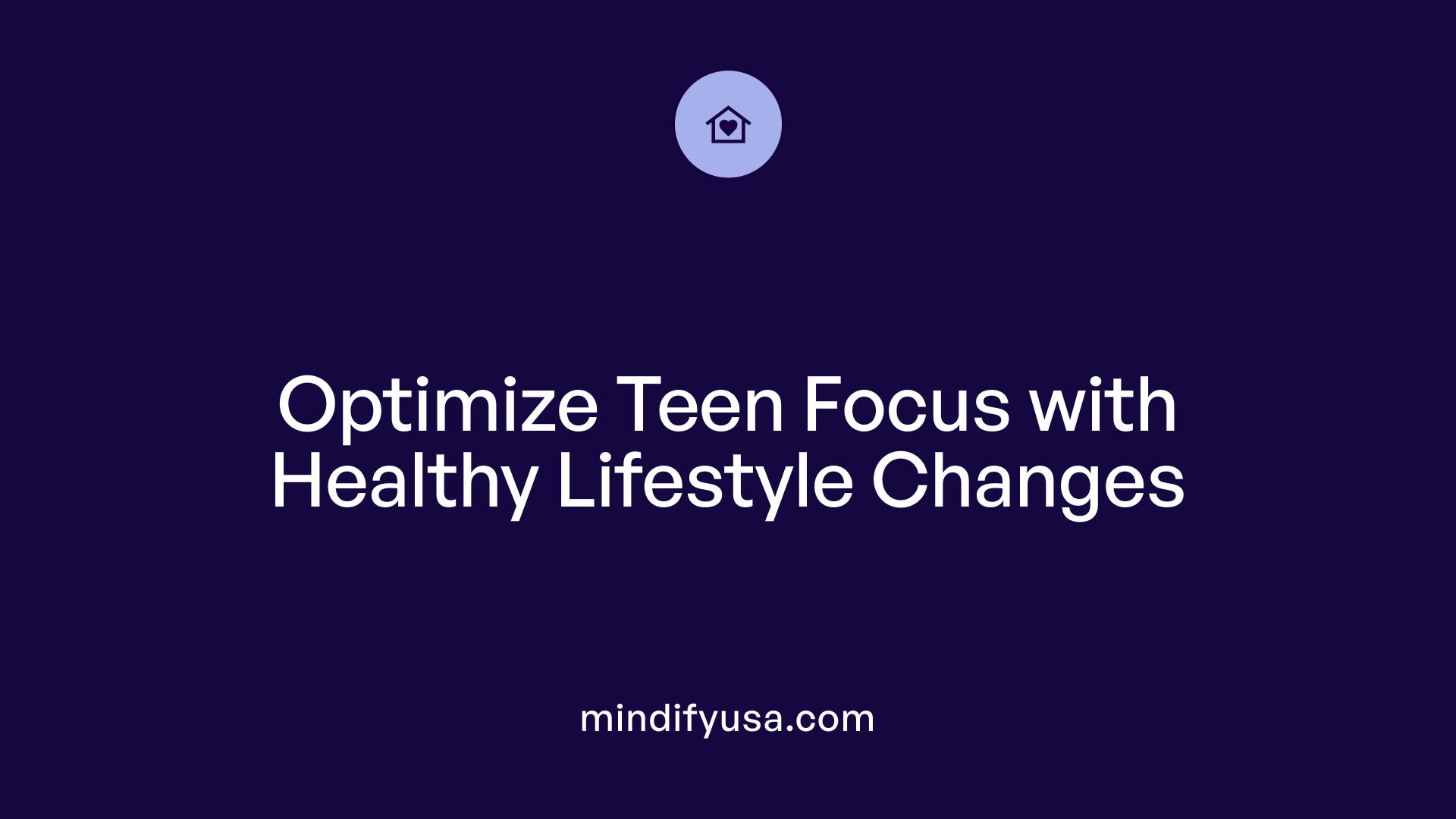 Managing ADHD symptoms in teenagers can be greatly supported through specific lifestyle adjustments. Nutrition plays a critical role; emphasizing a diet rich in fruits, vegetables, healthy fats like omega-3 fatty acids, and essential micronutrients such as zinc and iron can promote better focus and behavior. It's equally important to limit processed foods, sugar, caffeine, and artificial additives that may exacerbate hyperactivity.
Managing ADHD symptoms in teenagers can be greatly supported through specific lifestyle adjustments. Nutrition plays a critical role; emphasizing a diet rich in fruits, vegetables, healthy fats like omega-3 fatty acids, and essential micronutrients such as zinc and iron can promote better focus and behavior. It's equally important to limit processed foods, sugar, caffeine, and artificial additives that may exacerbate hyperactivity.
Good sleep hygiene practices are essential. Teens should aim for 8-10 hours of sleep per night, establish regular sleep schedules, and create a sleep-friendly environment by minimizing screen use before bed. Adequate rest helps improve attention, reduce impulsivity, and stabilize mood.
Physical activity is another beneficial factor. Engaging in at least one hour of moderate to vigorous exercise daily can help reduce hyperactivity, enhance mood, and improve cognitive functioning. Activities like running, cycling, or sports provide healthy outlets for energy.
Minimizing screen time, especially before sleep, supports better sleep quality and reduces distractibility. Setting boundaries around media use, using screen-free zones, and creating consistent routines for device use help establish structure.
Finally, incorporating stress reduction techniques like mindfulness, yoga, and meditation can improve emotional regulation and concentration. These practices teach focus and calmness, contributing to overall well-being.
Combining these lifestyle changes with medical or behavioral therapies fosters a supportive environment that enhances an adolescent’s ability to manage ADHD symptoms effectively.
Nutritional and Supplementary Support in ADHD Management
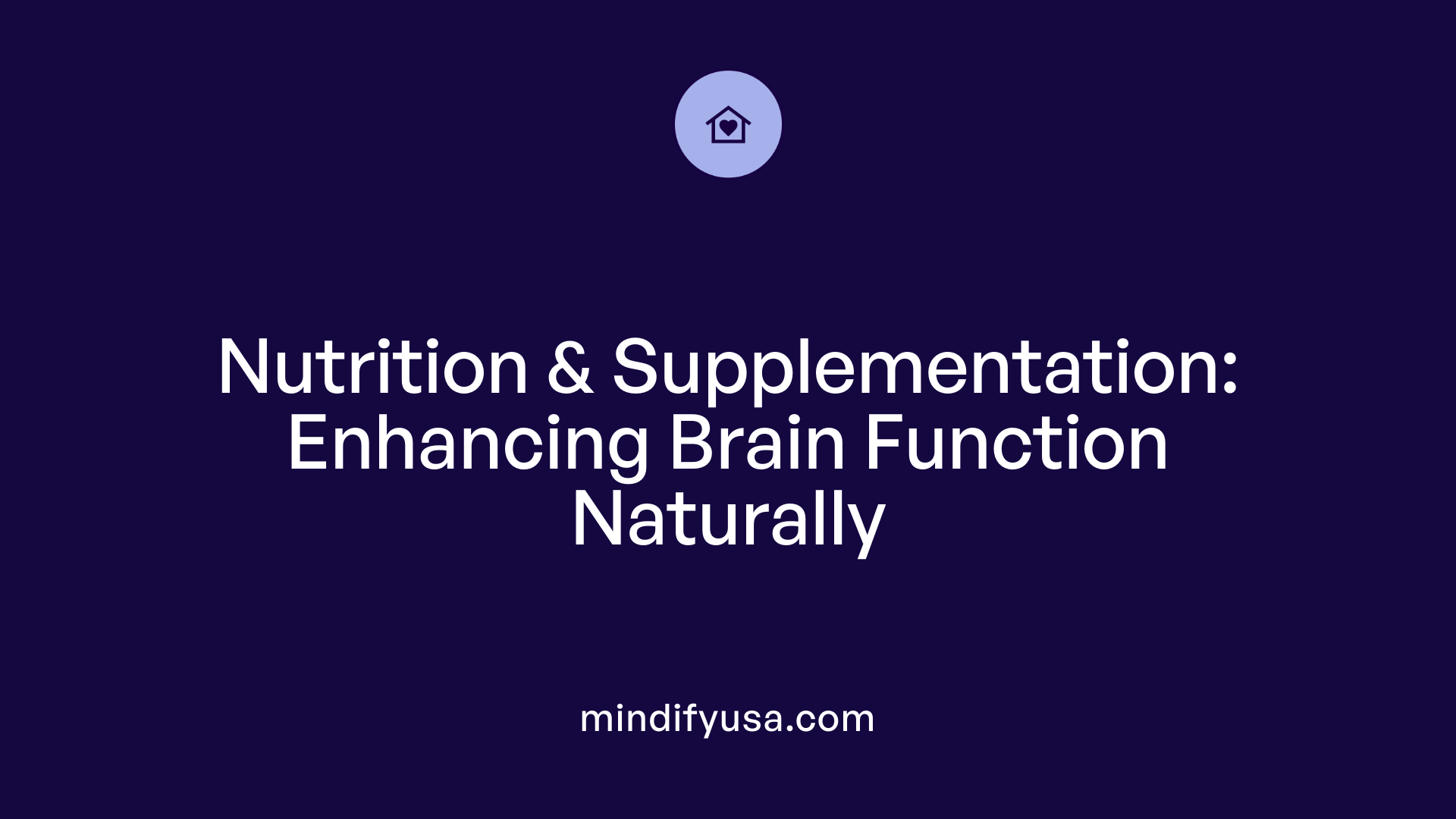
Why is a nutritious, balanced diet important for managing ADHD?
A healthy diet provides the essential nutrients that support brain development and function. Consuming a variety of fruits, vegetables, whole grains, and lean proteins helps maintain steady blood sugar levels, which can prevent mood swings and hyperactive behaviors. Proper nutrition also ensures that the brain receives enough fuel to optimize attention and cognitive performance.
What role do omega-3 fatty acids and micronutrients play?
Omega-3 fatty acids, particularly EPA and DHA found in fish oil, are shown to modestly improve attention and reduce hyperactivity in children with ADHD. They support brain cell structure and neurotransmitter function. Micronutrients such as zinc, magnesium, vitamin D, iron, and zinc are linked to improved behavioral symptoms. For instance, low levels of zinc and magnesium have been associated with increased ADHD severity, and supplementation can be beneficial if deficiencies are diagnosed.
Which nutrients have potential benefits, and what are their limitations?
Research suggests that supplementing with zinc, iron, vitamin D, and magnesium can positively influence ADHD symptoms, especially when deficiencies are present. For example, iron is crucial for dopamine regulation, and low iron levels can impair attention. However, most children do not need dietary supplements unless tests indicate deficiencies. Over-supplementation without medical guidance can lead to adverse effects.
What is the scientific stance on herbal remedies and neurofeedback?
Herbal remedies such as Ginkgo biloba, passionflower, and pycnogenol have been studied with some promising results, but their efficacy is not yet conclusively proven, and they may carry risks of interactions or side effects. Biofeedback and neurofeedback, which teach self-regulation of brain activity through sensors and computerized feedback, show moderate effectiveness, especially when combined with other treatments. Despite this, robust scientific evidence supporting widespread use is still emerging.
Practical and holistic approaches for teens
Holistic management often includes dietary adjustments to avoid artificial dyes and preservatives, which may worsen hyperactivity. Regular physical activity and mindfulness practices, like meditation or yoga, can further enhance focus and emotional regulation. Additionally, behavioral therapies, good sleep hygiene, and outdoor activities contribute significantly to overall ADHD management.
| Support Strategy | Evidence Level | Notes |
|---|---|---|
| Nutritional diet (fruits, veggies, proteins) | Strong | Supports overall brain health |
| Omega-3 supplements | Modest | Supports attention and mood |
| Micronutrient supplementation (zinc, magnesium, vitamin D, iron) | Varies | Effective if deficiencies are confirmed |
| Herbal remedies (Ginkgo, passionflower) | Preliminary | Limited evidence, caution advised |
| Neurofeedback | Moderate | Shows promise but further research needed |
| Avoid artificial dyes | Recommended | Potentially reduces hyperactivity |
Questions about nutritional and alternative support
What natural or alternative remedies can help manage ADHD symptoms in teens? Natural and alternative remedies can offer supportive strategies for managing ADHD symptoms in teens. Practices such as neurofeedback, mindfulness, yoga, tai chi, and spending time outdoors may improve focus, hyperactivity, and social skills. Dietary adjustments, including limiting artificial food colorings, preservatives, and potential allergens, along with maintaining a balanced diet rich in omega-3 fatty acids, lean proteins, and nutrients like zinc and magnesium, can also help. Certain supplements, such as Ginkgo biloba, passion flower, pycnogenol, and herbal preparations like Ningdong granules, have shown promise in clinical trials, though more research is needed. Additionally, behavioral therapies and ensuring adequate sleep and physical activity are important components of a comprehensive, holistic approach, always under professional guidance.
The Impact of Exercise, Sleep, and Environment on Symptoms
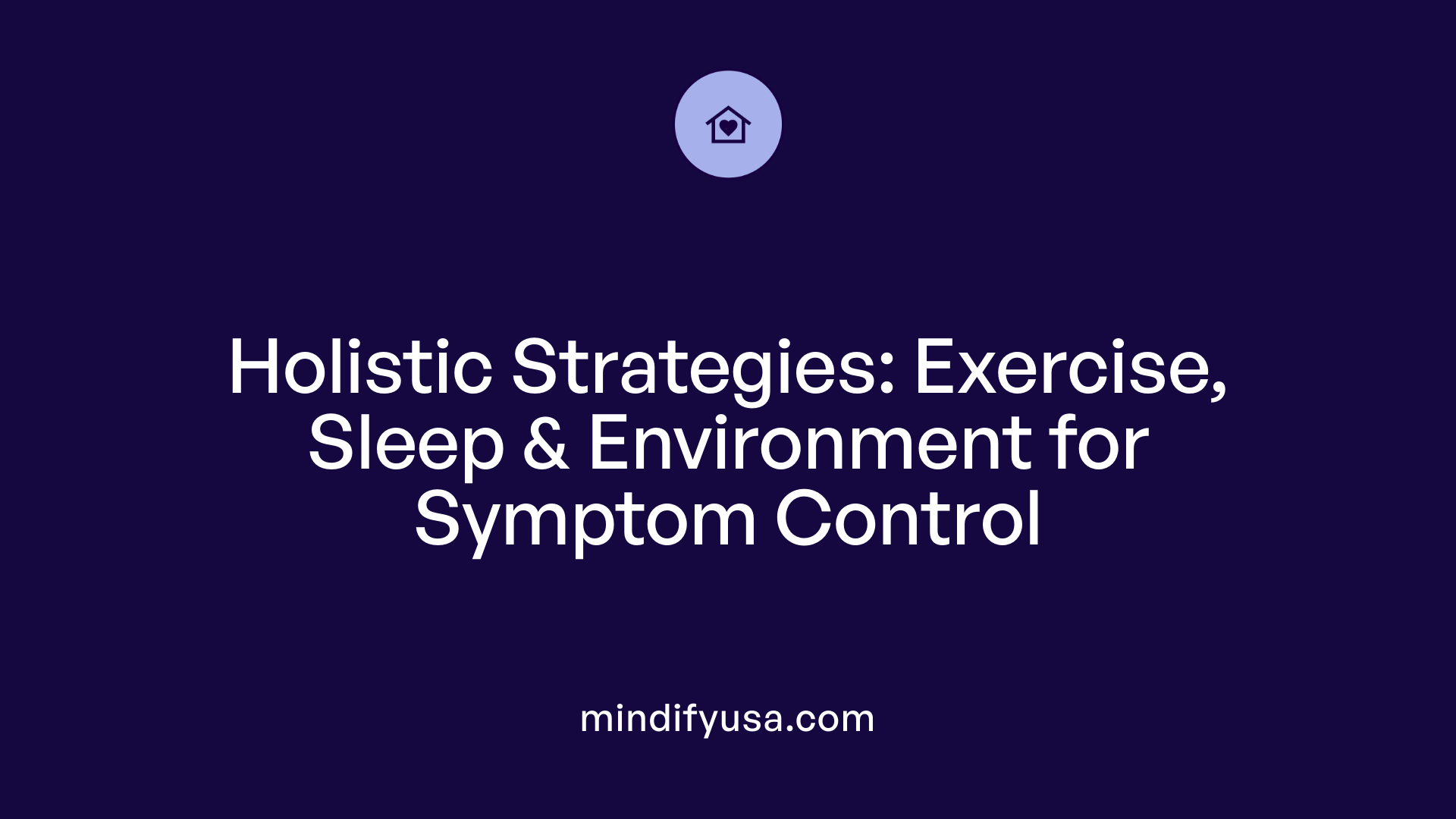
What lifestyle modifications can help manage ADHD symptoms in teens?
For teenagers with ADHD, making healthy lifestyle choices can play a significant role in symptom management. Incorporating regular physical activity—aiming for at least an hour daily—boosts the brain's production of neurotransmitters such as dopamine, norepinephrine, and serotonin. These chemicals are crucial for attention, mood regulation, and impulse control. Exercise also helps reduce hyperactivity and improve overall executive functioning.
Maintaining a nutritious diet is equally important. A balanced intake rich in fruits, vegetables, healthy fats like omega-3 fatty acids, and essential micronutrients such as zinc and iron supports optimal brain development and functioning. Avoiding processed foods, sugars, caffeine, and artificial additives can minimize behavioral fluctuations and hyperactivity.
Good sleep hygiene is vital for emotional regulation and focus. Teens should aim for 7-9 hours of quality sleep each night. Establishing a consistent bedtime routine, reducing screen time before bed, and creating a calming sleep environment help improve sleep quality. Adequate rest reduces irritability and hyperactivity, making daily management of ADHD symptoms more effective.
Creating a structured environment with predictable routines helps teens navigate daily tasks with less stress. Using organizational tools like planners or digital apps can assist in managing assignments and responsibilities. Additionally, minimizing distractions—such as noise or clutter—during study or work time improves concentration.
Exposure to green spaces and outdoor activities offers additional benefits. Multiple studies suggest that spending time in natural environments can reduce ADHD symptom severity, improve mood, and enhance focus. Activities like walking in parks, gardening, or outdoor sports provide a natural setting that supports attention and emotional well-being.
Combining these lifestyle strategies with behavioral therapies and, if necessary, medication forms a comprehensive approach to helping teens manage ADHD effectively. Regular routines, physical activity, mindful eating, good sleep practices, and environmental modifications work synergistically to improve attention, reduce impulsivity, and promote overall mental health.
The Risks and Benefits of Various Approaches
When managing ADHD, understanding the differences between medication and non-drug interventions is crucial for making informed choices.
Medications, primarily stimulant drugs like methylphenidate and amphetamines, offer rapid symptom relief. They can significantly improve attention, reduce hyperactivity, and lower impulsivity. For about 70-80% of children, medications prove effective, and their benefits extend beyond behavioral improvements to include reductions in injuries, accidents, and substance use disorders. However, these medications may cause side effects such as decreased appetite, sleep disturbances, or slight delays in growth. Fortunately, these effects are often manageable with medical supervision.
On the other hand, non-drug strategies focus on behavioral, lifestyle, and dietary modifications. Behavioral therapies and parent training teach children and caregivers skills to improve social behavior and self-control. Incorporating physical activity and ensuring good sleep hygiene can enhance attention and mood. Dietary strategies, like reducing processed foods and increasing omega-3 fatty acids, may also help mitigate symptoms.
While non-drug interventions generally have fewer side effects, their effects may be more gradual and require consistent effort. Combining medication with behavioral and lifestyle strategies often yields the best outcomes, balancing symptom management with overall well-being.
The long-term impacts of medication are still under research, prompting a trend toward personalized, multimodal treatment plans. An approach that considers the individual needs of each child—possibly integrating medication with behavioral therapy, lifestyle changes, and educational support—can maximize benefits while minimizing potential risks.
The Role of Complementary and Alternative Therapies
Are there evidence-based non-pharmacological interventions for ADHD in teens?
Yes, several non-drug therapies have shown evidence of benefit for teens with ADHD. Behavioral therapy and parent training are among the most supported, helping children learn to reduce disruptive behaviors and develop organizational skills. Classroom interventions, such as behavioral reinforcement and structured routines, also contribute to improved management.
Cognitive-behavioral therapy (CBT) can assist teens in managing negative thoughts and emotional responses related to ADHD, improving self-esteem and social functioning. Mindfulness practices, including meditation and breathing exercises, have demonstrated small but consistent effects in enhancing attention and emotional regulation.
Neurofeedback, which involves monitoring brain waves and providing real-time feedback, has garnered considerable research interest. Although some studies report improvements, evidence remains inconclusive on its specific effects beyond placebo, necessitating further research.
Physical activities such as aerobic exercise and body-based therapies like yoga and Tai Chi are safe options that can boost executive functions and mood. They are often recommended as adjuncts rather than standalone treatments.
Overall, these approaches can support symptom management when used alongside medication or as part of a holistic treatment plan. Their effectiveness largely depends on the quality of implementation and individualized adjustment.
| Therapy Type | Evidence Level | Main Benefits | Notes |
|---|---|---|---|
| Behavioral therapy | Strong evidence | Behavior modification, routine building | First-line in young children |
| Parent training | Well-supported | Parent skill development, improved child's behavior | Critical for treatment success |
| Classroom interventions | Evidence-based | Structured environment, clear instructions | School support enhances outcomes |
| Cognitive-behavioral therapy (CBT) | Moderate evidence | Emotional regulation, negative thought management | Particularly effective in adolescents |
| Mindfulness practices | Emerging evidence | Attention, stress reduction | Effect size varies, context-dependent |
| Neurofeedback | Mixed evidence | Self-regulation of brain activity | More research needed |
| Exercise and body therapies | Supportive evidence | Mood, attention, executive functions | Complementary, supportive role |
These therapies are most effective when tailored to each individual's needs and combined as part of a comprehensive ADHD management plan. Consulting healthcare providers knowledgeable in ADHD is essential to optimize therapy choices and outcomes.
Building a Supportive Environment and Family Involvement
How can parents and caregivers support teens with ADHD without medication?
Supporting adolescents with ADHD without relying on medication involves creating a structured, predictable environment both at home and in school. Parents can set clear boundaries, consistent routines, and organizational tools like planners or digital apps to help teens manage daily responsibilities. Establishing routines around homework, chores, and bedtime reduces chaos and promotes stability.
Behavioral strategies such as positive reinforcement—praising achievements and offering rewards—are effective in encouraging desired behaviors. Immediate feedback and reinforcement help teens develop self-control and social skills. Encouraging healthy habits, including regular physical activity, adequate sleep, and balanced nutrition, can significantly boost attention, mood, and overall well-being.
Collaboration with teachers is also essential. Securing academic accommodations and using behavioral interventions, like parent training programs, support the teen’s success in school and social settings.
Open communication fosters trust, allowing teens to feel understood and supported. Expressing praise, discussing feelings, and involving teens in decision-making build confidence and resilience. These environmental and familial strategies create a nurturing setting that empowers teens to manage their ADHD symptoms effectively and develop positive life skills.
A Multilayered Approach to ADHD Management
Managing ADHD in teens without medication involves a comprehensive, personalized strategy that combines lifestyle modifications, behavioral therapies, educational support, and environmental adjustments. While medication may be appropriate for some, many adolescents benefit from holistic approaches emphasizing healthy diet, exercise, sleep, structured routines, and social skills development. Collaboration among families, educators, and healthcare providers is essential for crafting an effective plan tailored to each teen’s needs. By focusing on these non-pharmacological interventions, it is possible to improve attention, reduce hyperactivity, and foster emotional well-being, enabling teens to thrive academically and socially while minimizing potential side effects associated with medication.
References
- 5 tips for managing ADHD in children - Mayo Clinic Health System
- ADHD: Tips to Try (for Teens) | Nemours KidsHealth
- Easing ADHD without meds - American Psychological Association
- Non-prescription interventions for attention deficit hyperactivity ...
- Managing ADHD Symptoms Without Medication | University Hospitals
- Non-pharmacologic management of attention-deficit/hyperactivity ...
- Helping Children with ADHD Focus Without Medication: 7 Tips for ...
- Can ADHD Be Effectively Treated Without Medication?
- How to help a child with ADHD without medication
- 5 Foundational Habits That Benefit ADHD Brains - ADDitude






































































































